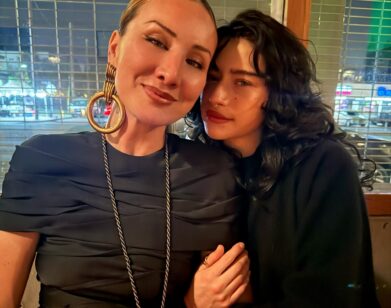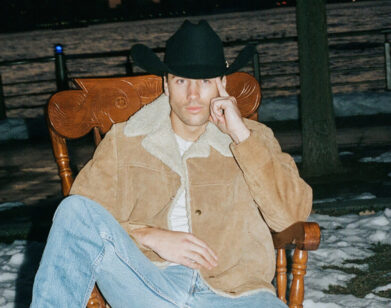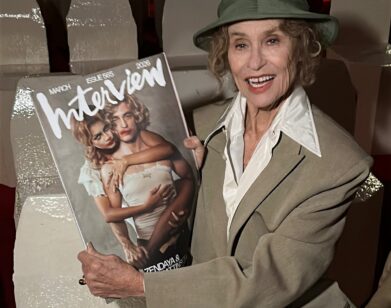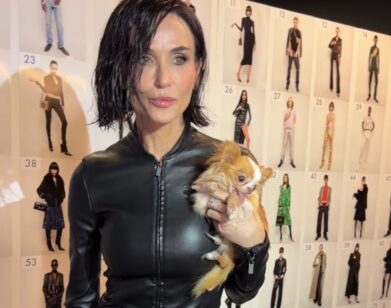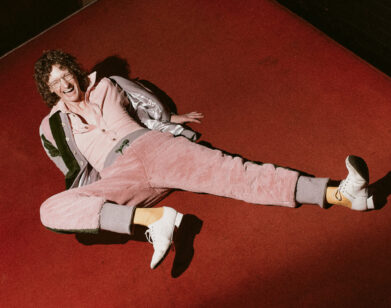Joel McHale, Community Liaison
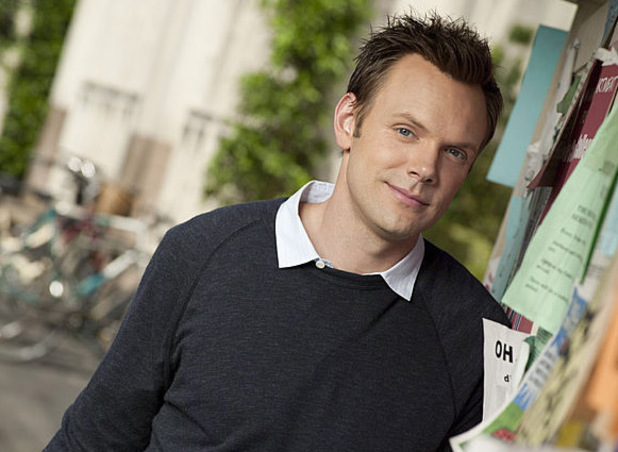
ABOVE: JOEL MCHALE
Way back last fall, as fans were gearing up for the fourth-season premiere of their beloved Community (bumped to Friday instead of its original Thursday timeslot), NBC suddenly yanked the show from its October 19 airdate and imposed an indefinite postponement. The message boards lit up, and several weeks later, after some behind-the-scenes cigar chomping, NBC announced Community‘s new February 7 premiere date—back to its original Thursday night home, filling in for the dearly departed 30 Rock.
Despite all this, plus the vitriolic turmoil between Chevy Chase (who quit the show in November 2012) and show creator Dan Harmon (who claims he was fired), Joel McHale has remained the eternal optimist and gracious peacemaker on the cast. We spoke to him a few months ago.
DREW FORTUNE: Community fans must be emotionally exhausted, with Harmon exiting and the constant threat of cancellation. How have you and the cast weathered the storm?
JOEL MCHALE: My goal, and the goal of the cast members, is to continue to make the show and hopefully make it great, and go the six, seven, or 12 seasons, and a movie and all those things. It was a crazy summer, with Dan and all of that. I let my feelings be pretty clear about how I felt about it all. Now we have new showrunners, who I worked with in 2005 on an American version of the British show The IT Crowd. They love the show, and as I said at Comic-Con, we don’t want to fuck the show up. That was actually the headline in the Huffington Post: “New Showrunners Vow Not To Fuck Up Community,” which I thought was pretty funny. I think, not biased at all, that it’s the best cast on television, next to anybody who works with Dr. Phil. I know the episodes are good, and I think people were worried that we’d become normal, or some sort of normal show. I’m not even sure how that could possibly happen. I don’t think anyone’s going to accuse us of not being weird or ambitious.
FORTUNE: Weird is not usually synonymous with ratings, but the cast and writers seem to wear the tag proudly. Have you ever felt the show has gone too far or not far enough?
MCHALE: I’ve never felt that. There’s never been a moment where I’ve said “You’ve gone too far!” To me, the show has always been kind of like Shaun of the Dead, where the world around us is fantastical, and this mundane setting is actually this magical, fantastical place. But all of it is deeply rooted in the characters’ personalities and who they are. People are always like, “Oh, it’s a parody show. It’s a reference show.” Yes, we totally make homages to things, but if we were just doing parody, that would make it a sketch show. Like the Claymation episode, which came out of Dan’s brain, came from Abed being so worried and anxious about the holidays coming and what a terrible experience the holidays have been for him, he detaches from reality. So, even with this fun Winterland, there’s still something very important happening. It’s all underpinned with that. If we didn’t do that, then I would say the show is just a parody and there would be very little reason for it. For the last three years, and with these new episodes, no one’s writing the show to be weird.
FORTUNE: I was hoping you could walk me through my favorite episode—the original paintball episode, “Modern Warfare.” How do you all get on the same referential wavelength? Did anyone need to be shown a John Woo clip?
MCHALE: That’s a good question. For my study, I watched Die Hard and Hard Boiled. That final scene where I shoot the dean in the head was based on the climactic scene in Die Hard. The episode wasn’t the season finale, but everyone thought, “Let’s do something big.” The director was Justin Lin, who directed the Fast Five movie. He’s this huge, wildly skilled movie action director. I don’t know who came up with paintball, but we made it fantastical, and just this post-apocalyptic world. One of my favorite moments is when Gillian is over Yvette and Yvette says “I’m going home.” Gillian’s like “I know, it’s okay.” And Yvette says, “No, really, I’m going home.” It aired, and I think people were over the moon because they couldn’t believe what we had pulled off. It took about two and a half weeks to shoot, and we went insanely over budget. For me, it was insanely fun to shoot, because I always dreamed of being in an action movie, and it was one of those moments when I thought, “I am literally being paid to have a dream fulfilled.”
FORTUNE: You looked pretty ripped. Did you hit the gym hard before shooting?
MCHALE: I don’t belong to a gym, but what I do is pushups and I starve myself. You think I’m joking. Ask anybody. I have those perfect pushup bars, and I go on these crazy diets where I cut out booze, sugar, flour and I just eat meat and vegetables. I’m always thinking about food. It’s sad. I’m starving right now. I can only eat beets and lentils. It wasn’t so bad at my 10-year high school reunion, but I just had my 20-year, and that’s when you really see dramatic changes in people. “I don’t recognize you! Oh my God, you were Tim!”
FORTUNE: Dan Harmon and Seth MacFarlane seem to have similar obsessions and senses of humor. How was your experience on Ted?
MCHALE: Oh, it was tremendous. And obviously, Seth MacFarlane has not been successful since then. The Oscars? Nothing else has happened for him. It’s sad. No, but Seth does have the same sort of chip in his brain that is only given out to a few people, in that he just knows better than everyone what is funny. Working with him on his first feature, it was like he had the same demeanor as [Steven] Soderbergh in his calmness. He’s just a happy guy, much like Soderbergh, who knows exactly what he wants, much like Soderbergh, and he’s also very collaborative. With Seth, if you pitched him a joke, he would laugh. There’s so many people who are all-consumed with jealousy, and so worried that they’re the ones being seen as funny. He’s totally unthreatened, and Ted really nailed it. It doesn’t hurt when you have a world-class actor like Mark Wahlberg, and Mila Kunis, who is not unattractive and very funny. My agents were like “Hey, there’s rumors, they’re talking about Ted 2,” and I’m like “My character died of Lou Gehrig’s Disease.” So I don’t think that’s going to happen.
FORTUNE: You seem like a really affable and humble guy, so I’m curious how much personal experience you bring to Jeff Winger or your Ted character. You do snark so well.
MCHALE: Well, I am never short of an opinion. As far as The Soup is concerned, I’ve always been very opinionated, for lack of a better term, about art. Not to sound too arrogant, but I guess I’m a connoisseur of telling people what I think is good and bad. With The Soup, I don’t know how many numerous people I’ve pissed off, but it’s just what I and the staff feels is funny and not funny, or what is egregious and needs to be pointed out. I think that people would say that I’m confident, and you kind of have to be in this business since it can be pretty brutal. Hopefully, I’m not too much of a dick to people. But there’s the other side, in playing Jeff Winger or the Ted character, there’s things that I don’t get to do in real life. With Jeff Winger, when you get to play a character that’s not perfect and has lots of flaws, I really respond to that. You get to behave in ways that are really fun.
FORTUNE: I read that you played college football.
MCHALE: Not well, but yes.
FORTUNE: When you were 18, was your dream to play pro football, raise a family, or win an Oscar?
MCHALE: None of those. [laughs] What was my dream when I was 18? My big decision when I was 18 was full keg or pony-size keg. I knew by about 16 or 17 that I was going to be an actor. That was based on the fact that there were not a lot of things that I could be really good at, or that I would enjoy enough to not run out of the building screaming. I watched the Oscars, but there wasn’t a side of me that was like “Oh, one day…” It was mostly “This is what I want to do, and how do I do it?” As soon as I decided that I was going to be an actor, for about five years after that, I just decided to not do much acting. It was like “Okay, this is what you’re going to be later on.” I wanted to play football and see how that went. In my mind, I knew I wasn’t good enough to be a pro, but I was having a really fun time doing it. When you’re on a college team, you can tell who’s going to be a pro or not almost instantly. Even during college and doing football, I was still doing improv at a theater called Unexpected Productions down in Seattle. That’s how I kept going. I quit football and did improv and plays full-time. I got on a sketch comedy television show in Seattle called Almost Live. It was a very strange show because it was locally produced, local affiliate, but fully funded with a big budget. Bill Nye the Science Guy came out of that.
FORTUNE: Be it film, stand up or television, do you have something you can point to as comedy perfection?
MCHALE: Richard Pryor’s Live on the Sunset Strip is comedy perfection. Steve Martin’s Wild and Crazy Guy album is an extraordinary thing. Any Bill Cosby album that came out in the ’60s was perfection. As far as movie comedic perfection, I would go with The Holy Grail and Annie Hall. For television, I would say the first season of the British Office was perfection. That whole series was perfection.
FORTUNE: What’s a perfect day for Joel McHale?
MCHALE: I’d like to fly the Millennium Falcon to a small café outside of Vienna, and there’s a PlayStation 3 or an XBox set up there. The family is there, and there would be brand new Star Wars Lego sets so my seven-year-old and four-year-old would be the happiest people on earth. My wife could get a massage and manicure/pedicure. Oh, and pork is being fed to us all day.
COMMUNITY RETURNS TOMORROW, FEBRUARY 7, AT 8 PM.

